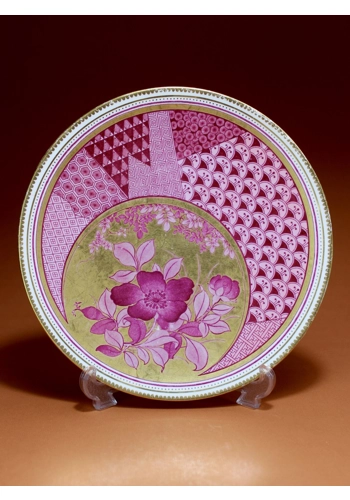Aesthetics Movement plate c.1870
A fabulous 19th century plate in shocking pink and gold, which is a lovely example of the Aesthetics Movement.
The Aesthetic Movement in Britain took hold of the Nation's imagination and spanned between around 1860 until 1900.
It aimed to escape the ugliness and materialism of the Industrial Age by focusing on producing art that was simply beautiful rather than having any deeper meaning – 'Art for Art's sake'.
The artists and designers in this 'cult of beauty' crafted some of the most sophisticated and sensuously beautiful artworks of the Western tradition and in the process remade the domestic world of the British middle-classes.
These new Aesthetic artists included the romantics of the Pre-Raphaelite Brotherhood, such giants as Dante Gabriel Rossetti, William Morris and Edward Burne-Jones.
The rose featured on this plate had symbolic significance for the romantics, as it is both wild, natural and epitomises beauty purity and fragility. It is often found in the works of the pre-raphaelites particularly the work of Burne-Jones.
I have not been able to trace the designer of this plate but certainly there are influences from the pre-Raphaelites.
The mark on the back is a pattern number with NP above it. Both Minton and Brown, Westhead & Moore used this NP for new patterns. In this case, the daring boldness of the pattern, the profusion of solid areas of gilding and the motif of a single large flower all follow similar designs known to have been produced by Brown, Westhead & Moore, and so I have attributed it as having been most likely manufactured by this company.
Makers marks:
Hand written in red enamel NP 2859
Dimensions:
228 mm diameter at the rim
Weight:
440 g
Age:
150 years
Condition:
Good condition, no chips cracks or restoration. Some wear to the gilding at one edge
Maker:
Attributed to Brown, Westhead & Moore














